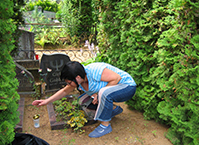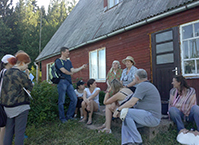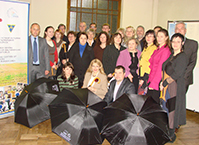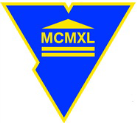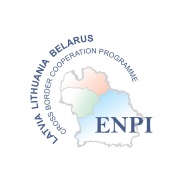Front after being wounded
Categories: Wartime, Jakov Kiselev
And then we passed a commission in 4 months, and again back to the front. So, there gathered a team of the wounded, a supervisor was appointed there.
Did you come back to your military unit or to another one?
No, there wasn’t any military unit here. They knew where to go. An assignment was given to the certain division, it meant that you could go to Bryansk Oblast for selection. There was river Mius. So, they sent us to that region, the others were moved to the other division. You know the place where there was an assembly station. So we came there, they lined us up, not us because we were only 2 persons. In my opinion. I don’t remember exactly. There were arriving people from throughout, from other hospitals, the newly recruited. That was a mess of people. There were millions of people at the front. So they drawn up all the newly come during several days. Army officers were walking and saying, “Tankers, three steps forward!”, then they named a military academy and the tankers were marching. ʻAck ackers!ʼ, and the ack ackers were marching. ‘Artillerists! Machine gunners!ʼ. I was standing. Not marching. At that time I was thinking if they said ʼsub-machine gunnerʼ, I would march. At the same time senior lieutenant came up to me and said: ʻDo you speak German?ʼ. I told him ʼYes, I do. ʼ He continued: ʼWill you go on the scout?ʼ. ʻYes, I will.ʼ This is not what you call a machine gunner.
I would like to tell you that you are brave. You are a bit adventurous kind of man.
Me and one more guy Volodzya Kolesnichenko who was a record clerk… I don’t remember how he could find the way here; he dressed up very well. He, this record clerk, had a good hair style. His education was only 10 years of secondary school. Very good-looking man! Well-groomed! So they sent both of us on the scout. We said: ʻWe agree.ʼ The senior lieutenant was a leader of the group. We stayed there for two weeks. We were living there like in a paradise. We got food, but I forgot to change my soldier's clothes so I was dragging around wearing them. Two weeks later, suddenly Lukin, probably that was his surname, sent for us and said: ʻGuys, you will be taken away from meʼ. ʻWhere we are taken away?ʼ. ʻTo the political administration of the frontʼ. Holy cats! We both told him, ʻWe do not want to go there, we haven’t been to the scout yet, we haven’t caught anybody, nothing, they are only feeding us and taking care, it is freedom.ʼSo they taught us, of course, the basics. Later the senior lieutenant said: ‘I cannot do anything, I must fulfill the order, this is the order’. They found a car moving in the same direction and we drove away. We arrived at the front administration that was in Krasnodon, famous Krasnodon, one and only. So we arrived, reported at the human recourses office, we found that office. So we had reported, and we were said: ʻHere is your flatʼ. The adjunct accompanied us over there, the old people, the old man and woman, were living there together, and he told them: ʻThey will be living at your placeʼ. We thought about a room where there were two beds at least. So there was a room, there were two beds in it. That’s all. Before we came there, several people had been already living there. All of them had gone to the front. What did it mean, what kind of division was that? That was a front reserve. Political reserve. There were Komsomol organizers, Party organizers, deputies on political issues, political officers. So you understand that there was no person with title lower than lieutenant, I haven’t met anybody with title lower than colonels, generals. So about us. It turned out that both of us finished 10 years of school. So we were appointed as Komsomol organizers and that is why appeared in the front reserve; so in case when somebody was killed or wounded we had to change them there. That was a kind of a conveying machine. Well. We were allocated there, so we lived there, he, Volodzya, was well-dressed, but I was very grubby. All military officers were dressed like people. There wasn’t any soldier. I was the only one. But that was ok then, we had good food, at the canteen, nothing to speak of. We came there in the morning, for lunch and for dinner. The whole shooting match. So we were living, nobody was disturbing us. But some time later there happened such a small thing. A granddaughter with her friend came to this man, to this old man we lived with. So to cut the long story short, a day after we went to see them off at dawn. We left Krasnodon 2 kilometers away and suddenly we met the colonel, head of the human recourses office. He was driving a jeep on the way to Krasnodon. I didn’t know where he had been to. When I looked at him, he took a rapid glance at us and I thought that was a bad sign for us. We accompanied the girls a very little more. We let them go and came back to Krasnodon. As soon as we came the batman ran and told us to see the head of the office. So we came, called at the office. And he started, he got together the whole staff headquarters and said: ʻWell. Look at these lady’s men. The country is at war, the people are killed, blood is running, and they are here with the girls. What could people think about us? What are we doing here!?’ And he started mudslinging, so I was standing and thinking: ‘I am a true lady’s man. Very nice.’ ‘I don’t want to see you!’. And I was standing and thinking: «I don’t have any fears; I cannot be lower in title than I am. I am just a soldier’. ‘That’s it! I don’t want to see them here!’. And we left. So we were caught on this. Three hours passed. We were called again. There was already a car moving in the same direction. That’s all, to the front as Komsomol organizers. How did that concur? We lived there so much, for two weeks at least and there was nothing happening, and suddenly, probably they wanted to kick us away at the same day, so here you are! Volodzya and me were sent to the same regiment. But I was put to the first battalion as a Komsomol organizer. My predecessor had been killed, and he (Volodzya) was sent to the third battalion as a Komsomol organizer, his predecessor had been wounded. And what a Komsomol organizer was responsible for? What did he have to do? A Komsomol organizer was responsible for the similar job as a Party organizer but dealt more with Komsomol members. And as all Komsomol members were young, they were 24, 25 or 26 years old, sometimes 23 or 22 years old, we all were of Komsomol age. So this is how you should be in the war.
Did the soldiers appreciate the official propaganda?
I hope you understand, we all were zombified somehow. I can say now we could tell only: «Aha. I understood, I knew, I saw». I saw. I knew. It seemed that this was as it should be. That was a right norm at that time. We appriciated it. Of course, we appreciated it. Someone did it better. Someone did it worse, someone didn’t appreciate it at all - that happened. But at that times people were in fear of telling a word.
There were penal military units, weren’t they? You knew about them.
Of course.
And did you meet barrier troops?
Of course, I did. There was everything. Everything. You know, there were secret agents, persons specially put in. Those who. So they... when you arrive... They send for you: „Are you a Komsomol member? Do you serve the Soviet Union? Do you believe in the Soviet? Do you understand that you have to fight with enemies?”. “Yes”. „Sign an acknowledgement”.
If you get to hear or know, try to... So, actually. We were fighting after all. We were fighting.
Where did you get in as a Komsomol organizer? What front was that?
I was sent to the 4th Ukrainian one. Two times. The first time I was at the South-West front, the second time I was at the 4th Ukrainian front. Tolbukhin was our commander. So there. I got in this battalion that stood at the Mius River. It is Voroshilovgradskaya Oblast. They had already been standing on the defensive for some time, and the battalion counted 200 people, it is hardly anything. There is always 600 people in a battalion if it is properly formed. So there. Well, there were lots of tried soldiers. This is not the same as rookies, not the same as beginners. There were people who were already wounded, staying at the front for some time.
What were they distinct in?
the ability to fight.
And what does it consists in?
Оh! Well, it is entirely different. Well, they are shooting, there is shooting, so you will be making bows to every bullet if you are a newcomer. And he will be patient, because he feels deeply, he feels by the sound that there will be undershoot, overshoot, the bullet will hit alongside, and you don’t need to make bows. And not only this. He knows where to lie down. Everything is different. He does this as an experienced person, like a factory worker at the machine, either it is a newcomer or it is really a master who is standing and working. These are two different things. One should be able to fight. This ability is not for everyone who wants to fight. We sang songs the way that we were…
And who died at the front first? When the soldiers were brought was it clear who would die first?
Is it a question? What do you mean who will die first? I don’t know. You never know, you never got it. Oh, my God. What did we have in our battalion? First of all, at the front when you are on the offensive do you know how long may a foot-soldier stay there? Well, how long? Ok, one day, two days. Well, maybe five days, or a week, or two weeks, but it is maximum, too long. However, you will be killed or wounded. No one could hold out longer. Only chair borne troops or artillerists that were at the howitzers, far away from the front. Or over there, cutting the long story short, those who were not at the firing line seized up not only military medals, but no one should jealous of them, but they survived; and those who were staying at the firing line as foot soldiers could not survive, could not stay in theory, it is impossible. Well, about us. When we were liberating Donbass, when we liberated it and came into we were welcomed warmly at Donbass.
But in general, when you started to liberate the occupied territories, you were conducting an attack at the Ukrainian occupied territory, weren’t you? What did you see?
You know I saw lots of interesting things. When we were carrying by storm Donbass, were liberating it, our battalion also liberated Dzerzhinsk, Voroshilovsk, Krasnoarmeysk, Katsievka at Donbass. This is a huge populated area. Well. We were welcomed amazingly. That was summer, it was September, yes. And people were standing in crowds at the road giving us berries. Fruits, berries, flowers. To eat. Bread, say what one wants.
And did the local people tell you anything?
Of course, they did. They gave up the people. They told us: “There is a policeman living over there”. They told us stories. Why it is like this and not like that.
Was Donbass destroyed?
No, it was not at all. It was quickly. That was already after Kursk battle and our troops were conducting an attack to the Germans, they had to switch forces over there, so it was much easy for us. So Donbass didn’t suffer a lot. But when we got off the Donbass and found ourselves in the prairies of Zaporozhye and Dnepropetrovsk, oh, we could see quite a different picture. They, the Ukrainians, lived not like here in Belarus. The Germans had quite a different attitude to them. They, the Germans, gathered different mobsters there. Do you know who were the most of the supervisors, for example in Auschwitz? They were Ukrainians. Who ran away first? All ran away. But when we came into these prairies there was a healthy Ukrainian man in every house that could serve in the army. But they had run away. And here we came. Not we, but our commands collected men under 60 and brought them to the army. And our battalion was made up. Well, I saw how they lived. Oh, my God! When you come into any house there is a storeroom full of grain. There were goods and chattels, during the war times. The Germans let them live to the full.
What was their attitude to the Red Army?
Their attitude? How will you regard it? If you regard it badly you will be shoot up. How will you regard it?
Did you feel the difference with the residents of Donbass?
Оh! Of course! When our battalion was made up all the young Ukrainians were fighting smoothly. The elders weren’t just what they used to be, but in the army there is no way out. There is an attack. All are running and you have to run. All are shooting and you have to shoot, and you do shoot not to be killed. You see.
And do you remember when you shot for the first time? Did you see a person you shot at?
One person.
Is it frightful to shoot at a person?
You know, there is nothing scary, it is even pleasant. What do you think; in fact, I have seen how our people were killed. He was shooting at our people. You feel a sense of satisfaction. We were seven, seven. The officers fell on us, the Germans ran. They thought that they were surrounded; we didn't think about roundup, we joined the battle, we were seven, well, that was the entire battalion, but somehow we ended up at the edge. We passed the Germans and the Germans began to climb the mountain and were standing lower. Why did we go to the mountain? To make a lodgment, otherwise we would be killed. We climbed to the top and saw ...that the Germans did not shoot at us. We were going up, and they stayed silent, they were below us. And then they decided that the troops were already approaching, but not only seven soldiers; and they ran to the village. And one German officer was coming upon us. There were seven of us, and he was going alone. I saw that was an officer, they cried to him: “Hands up! Hands up! Hände hoch!”. He was going. And seven of us were spread along like a chain. Three of us were standing closer to the edge. And he was still going and already came up closer, we clicked on the closures, he was scared and raised his hands. Then we saw a gun in his hand. He took it by the handle, and then came up to us, like all the way to Ira, he caught this gun and pfft, pfft! He fired at two soldiers standing in front of him, I was standing aside. Can you imagine how I was overloaded? One shoot was past at all; the other hit my friend’s cheek but came out, nothing serious. I was standing behind and clicked. That’s all. It was visible. When I was firing machine-gun it’s not clear at whom you shot, all are shooting at the same time. It’s not clear if you hit somebody or not.
And what did you liberate after Donbass?
We went to liberate Ukraine further. We reached Zaporozye. We settled on the outskirts of Zaporozhye. But suddenly we received an order to leave it and we were brought to the Crimea. We were leaved. We had to get into Melitopol. On our way. We went on foot 80 km within one and a half days. In my opinion. Terrible Wagons were going. So, those who lost consciousness were taken to the wagon. When he came to himself he had to go by himself. So, they joined the battle. The battle was at the River Molochnaya. That was a scary thing. As far as I know, there were 35 thousand of wounded. The railway had been destroyed by the Germans, when we liberated Melitopol, a terrible thing; there was no place to put the wounded. There was a medical and sanitary battalion, but it was not enough, they took the people away without it. So, ok. What about me. I was ... Our soldiers were making further for the Crimea. There is about 100 kilometers or a little more to the Crimea. And I was wounded there; I think that happened near village Novofedorovskoye. 12 kilometers from Melitopol on the way to Crimea.
Images
Audio
Researcher: Наталья Иващенко, кандидат исторических наук, ГрГУ им. Я. Купалы, Светлана Силова, кандидат исторических наук, доцент, ГрГУ им. Я. Купалы


